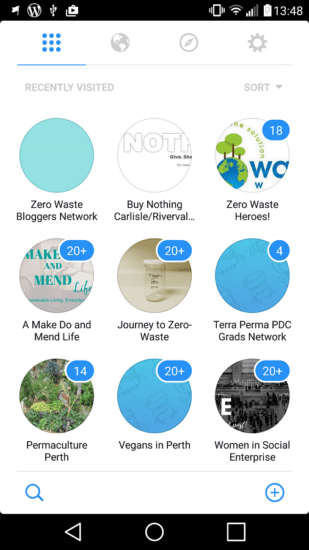A Zero Waste Guide to Sharing (+ the Sharing Economy)
There’s already a lot of stuff in the world. Dare I even say, too much stuff in the world. If manufacturers declared they would be making no more cutlery sets, or dining chairs, or cushions in the foreseeable future, it’s unlikely we’d be unable to eat dinner or get comfy. We’d make do with what we had, or use what already exists. We’d borrow, and we’d lend.
Sharing stuff isn’t new. Since the explosion of the internet and our increased connectivity though, this idea of sharing what we have has also exploded, because we are no longer restricted to the people we know. Technology has adapted to make it easier for us to borrow from and lend to complete strangers.
The terms ‘the sharing economy’, ‘collaborative consumption’, ‘peer-to-peer lending’ and ‘access economy’ are all used interchangeably when talking about this kind of lending, and the definitions are often confusing and contradictory. Personally, I don’t think the definitions are important. (But if you’re really interested ,this article does a great job of explaining.)
The premise is: you have something you’d like to share or give away, and you need to find someone who wants what you have; or you need something and would like to find someone who has what you need.
It doesn’t matter whether it’s peer to peer lending or if there is a company involved; if there’s money exchanged or if it’s free; whether it relies on technology to work or good old word-of-mouth; whether it’s for-profit or non-profit. It’s all sharing – making better use of time, resources and energy.
What is important to me, and anyone else interested in owning less stuff and creating less waste, is the idea of resource optimization. Getting the most use (and best) out of stuff that already exists. For people who are passionate about this, the explosion of the sharing economy has been great.
Global versus Local?
Global or local – which is better? I think it depends, and both have a place. If I travel to the other side of the planet, being able to find accommodation and travel easily is very helpful, so global networks work well. It’s unlikely that I’ll need to borrow a lawnmower whilst I’m there though, so global tool networks or general borrowing sites are less helpful. Global borrowing sites tend to be more focused around urban cities.
Global networks have bigger infrastructure and costs, so tend not to be free. Keeping things local means costs are much less. Local options are much more useful for meeting local people, reducing travel, plus building networks, relationships and community.
Many global share sites have launched to great fanfare, only to fold within a couple of years. The internet is littered with these stories. I think it’s a sign that in many cases, local is best.
Global Sharing Networks (The Ones I Use)

The few global sites I use are one where money generally changes hands. In these cases, having the security and reputation of a global network can go a long way in building trust.
Accommodation: Airbnb
Maybe the best known of the sharing websites, Airbnb is a global network allowing people to rent out their spare rooms and entire homes to travellers for a price. I like knowing that rather than homes sitting empty, they are being offered out to others.
Cost: Accommodation is charged per night. Fees apply to hosts who rent out rooms. Free to join
W: www.airbnb.com (if you sign up via this link, you’ll save $50AUD on your first booking.)
Accommodation: Couchsurfing
This is a global community of travellers offering their couches, floors and spare rooms to those wanting free accommodation, and also offering meetups and information about local events. I used it to both stay and to host back in 2008, but I have no current experience of the site.
Cost: free for basic membership (premium membership also available); accommodation is free
Classifieds: Craigslist
This is the most popular classified list in the US, with sections devoted to jobs, housing, personals, for sale, items wanted, services, community, gigs and discussion forums. I’ve never used it as it isn’t popular in the UK or Australia, but I have used similar sites.
Cost: free to list most items; some goods free to buy, most have a cost
Classifieds: Gumtree
The most popular classified site in the UK, this is a great way to pick up second-hand items, find a new home for your unwanted stuff. It also offers services. Although it’s an international brand, most sales are made locally via cash on delivery/collection.
Cost: free to list most items; some goods free to buy, most have a cost
W: www.gumtree.com.au (Australia), www.gumtree.com (UK)
Composting: ShareWaste
This website and app connects those with compost and food scraps to those with compost bins. It’s a fairly new app so whether it will stand the test of time, I’m not sure. I have registered my bin and as yet, no-one has used it. There was no-one registered within 400km of where we were staying whilst on holiday – and I cannot believe not a single person there had a compost bin!
Cost: free
Selling: eBay
This auction site allows users to buy and sell used goods, either by auction or for a fixed price. Most countries have their own eBay site, but if international shipping is offered, listings may appear across multiple sites, meaning there is access to a huge audience. It’s a useful way to sell rare or unusual items, but most items must be posted, so weight is a limiting factor.
Cost: free to join; listings may be free or a small cost, fees payable once an item sells
W: www.ebay.com (US), www.ebay.com.au (Australia), www.ebay.co.uk (UK)
Transport: Shiply
Shiply connects lorries and trucks already on the road with people who need things delivered (such as bulky things they’ve purchased second-hand on eBay). Shiply aims to make use of transport already on the roads to reduce carbon emissions. Users list their delivery request, and companies quote for the job based on their existing routes.
Cost: free to request a quote as a customer or join as a transport company; fees are payable if a quote is accepted.
Transport: Uber
Uber connects people with cars to people who want to go somewhere. It’s a peer-to-peer ride-sharing service where private cars are used in place of taxis. No cash is exchanged as all transactions are made through an app.
Cost: free to join; taxi services are charged to users.
W: www.uber.com
Local Sharing Networks (Ideas to Look Out For)

These are ideas rather than specific sites: whilst the underlying principles are generally the same across the world for each idea, the companies, organizations and groups that run them are different.
Bike Share
Bikes share schemes differ from bike rental in being a much more casual arrangement, often for shorter periods of time, and with the option of picking up at one point and dropping off at another. Often these points are close to train stations, and are unmanned bays. The idea is to make bicycles available for people to take short trips as an alternative to car use or motorized transport.
Whilst not currently active in Perth, it is reported to be coming shortly. Currently these bike-share schemes operate in 172 cities in 50 countries.
Cost: varies, but is often free for short trips
Car Share (Car Clubs)
Like the bike share schemes, car shares are like short-term rentals where the car is charged by the hour. They are useful to anyone needing a car on a short-term basis but who don’t need to own or even hire a car for extended periods. They work on a self-service model so there is no restriction with opening hours. Car-share schemes require users to join as a member.
There is currently no car-sharing service in Perth, but it is common in some parts of the world, with 1.7 million users reported across 27 countries.
Cost: membership fee and subsequent car hire fees
Community Groups
These are groups of like-minded people, joined by a common interest. The common interest could be a hobby (gardening, fishing, beer brewing, sewing, art), it could be based on age or circumstance (young mums, working parents, retirees) or it could be based on a common interest (sustainability, politics). These groups are great to tap into for many reasons: to connect with others and share ideas; to gain access to specialist equipment; and to find or pass on second-hand items.
Cost: Some free, some with membership fees
Where to find: community notice boards, or Google search your local area.
Facebook Groups
Facebook groups are different to Facebook pages. Facebook groups are member groups where there is no news feed, but a discussion area where any member can post. (In contrast, a Facebook page is “owned” by a single person, team or organisation, and they control the news feed.) Facebook Groups are currently ad free. You request membership rather than liking a page, and may need to meet conditions to be accepted (like being located in the area). Groups can be public, closed, private or secret.
You need to be a member of Facebook to use Facebook groups, but there is a separate Facebook Groups app you can install on your phone. This means you can be a member of groups without actively using a personal Facebook page.

This is what the “Facebook Groups” app looks like on my phone, along with a collection of groups I’m currently a member of.
There are groups for everything you could imagine, and plenty you wouldn’t. Join the ones that appeal to you (you can always leave if you change your mind). If you see a great idea for a group but can’t find one in your area, start your own!
Cost: free
Library
Anybody who is not a member of their local library is seriously missing a trick! We use our local library to borrow books, DVDs and magazines, and occasionally use their printing services – which means we do not need to own a printer. All libraries are different, and not all services are free, but membership usually is.
What’s on offer: Books, eBooks, Magazines, newspapers, DVDs, CDs, audiobooks, internet and printing services, talks and workshops
Cost: Usually free to join, most services free, some incur a small charge
Where to find: check with your local council.
Specialist Libraries
These are usually community- or volunteer- run services, but may also be run by local councils. They lend specific items, such as tools and light machinery, gardening equipment, or toys.
Cost: Varies – there can be a membership cost, and often there is a small charge to borrow items
Where to find: check with your local council, or Google search your local area.
…
This is by no means an exhaustive list, and new share sites pop up all the time. I hope it gives you some insight into the kinds of things out there, and encourages you to think about embracing this bold new world (and yet very traditional, centuries-old idea) of sharing.
Now I’d love to hear from you! Are you a sharer – and how do you share and borrow? Do you prefer to use global networks or local ones? Do you have personal experience of any of these sites or any of these ideas? Do you have any others you’d recommend? Have you had any bad experiences with sharing? Any stories to share? Are you involved with running or administrating a local sharing site, and how have you found it? How to you feel about the growth of these sharing networks – is it a good thing or a bad thing? Are you still undecided? Please tell me your thoughts in the comments below!
[leadpages_leadbox leadbox_id=1429a0746639c5] [/leadpages_leadbox]



